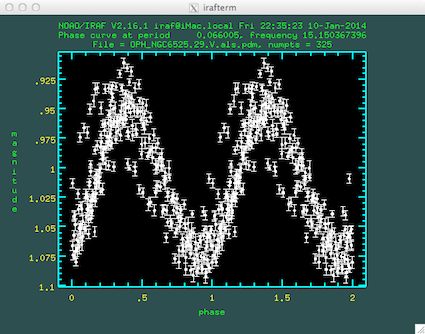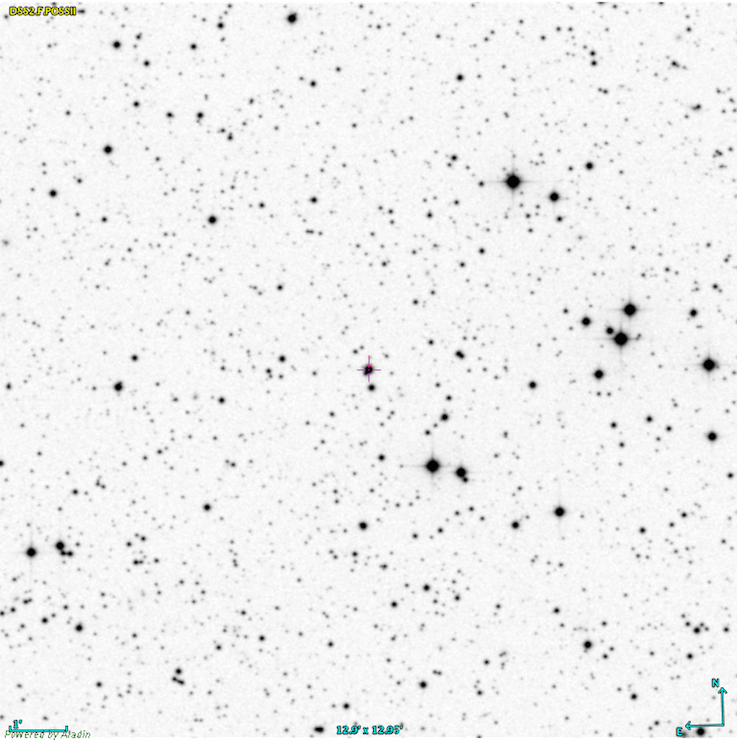| Article in PDF |
"Peremennye Zvezdy", Prilozhenie, vol. 14, N 10 (2014) |
A new variable star in the field of NGC 6525: TYC 1012-563-1
F. A. Kahle
Germany, Hilden
| ISSN 2221–0474 |
Received: 16.06.2013; accepted: 2.09.2014
(E-mail for contact: frank.kahle@me.com)
| ||||||||||||||||||||||
Remarks: |
| The field of NGC 6525 was monitored during three months from June 2013 to August
2013. We performed Johnson–Cousins BVI photometry using a 235 mm Schmidt–Cassegrain
telescope, equipped
with
a SBIG
ST-7 XME. The gain and readout noise for the CCD used were taken to be 2.62 e-/ADU
and 15.98 e- respectively. Basic data reduction has been performed with IRAF package
ccdred,
and for aperture and psf photometry we used IRAF package daophot. The coordinates
were derived with the software tool astrometry.net
(Hogg et al. 2008). To search for periods and epochs
we used
IRAF task pdm, the starlink package task period and the software tool FAMIAS
(Zima 2008). Subsequently
we searched for new short-term variables.
Our effort was rewarded by the identification of TYC 1012-563-1 as a new short-period variable. Combining our results for JD 2456449 with ASAS data (Pojmanski et al. 2005) we find epoch, semi-amplitude and period to be 2456449.5045, 0.061 and 0.0660032 d respectively (period analysis based on ASAS data supplemented by own observations shifted to common zero point). Because of the larger scatter in the ASAS data we decided to reject the ASAS data for further analysis. A period search with the FAMIAS yields period of 0.0660050 days (f0 = 15.150366 c/d) with S/N = 10.0 for our V-data with a semi-amplitude of about 0.060 mag in V, 0.074 in B and 0.033 in I. A further analysis of our V-band residuals yields f1 = 28.838778 (c/d) with S/N = 4.1 and period ratio 0.525 which is in good agreement with the expected period ratio of 0.521 for the third overtone. From UCAC4 we find the B and V magnitudes for TYC 1012-563-1 to be 12.487 and 12.163 respectively, i.e. B–V = 0.324 (not yet corrected for interstellar reddening) corresponding to spectral class F. This places a lower limit on Teff of approximately 7055 K. According to these data we assume TYC 1012-563-1 a DSCT type star, oscillating in the fundamental mode and third overtone. From a recent period-luminosity relation (Petersen & Cristensen-Dalsgaard 1999) we then find Mv = –3.725 × log(P) – 1.969 = 2.428, Mbol = 2.428 + 0.049 = 2.477 and a mass of 1.7 MSun. For the fundamental mode f0 we found the following period ratios with the FAMIAS: A(B)/A(V) = 1.24677 ± 0.108438 A(I)/A(V) = 0.548097 ± 0.0646843. Because of the large error in the B-ratio our data were insufficient for further mode identification with the FAMIAS. Acknowledgements: This research has made use of the VizieR catalogue access tool, CDS, Strasbourg, France (Ochsenbein et al. 2000). The software package FAMIAS was developed in the framework of the FP6 European Coordination Action HELAS. IRAF is distributed by the National Optical Astronomy Observatories, which are operated by the Association of Universities for Research in Astronomy, Inc., under cooperative agreement with the National Science Foundation. |
| References: |
| Hogg, D. W., Blanton, M., Lang, D., et al., 2008, Automated Astrometry, Astronomical
Data Analysis Software and Systems XVII, Argyle, R. W., Bunclark, P. S., and Lewis,
J.
R., eds., ASP Conference Series 394, 27
Ochsenbein, F., Bauer, P., Marcout, J., 2000, Astron. and Astrophys. Suppl. Series, 143, 23 Petersen, J. O., Christensen-Dalsgaard, J., 1999, Astron. and Astrophys., 352, 547 Pojmanski, G., Pilecki, B., Szczygiel, D., 2005, Acta Astron. 55, 275 Zima, W., 2008, Communications in Asteroseismology, 155 |
Light Curve
Finding Chart 
Data Source |